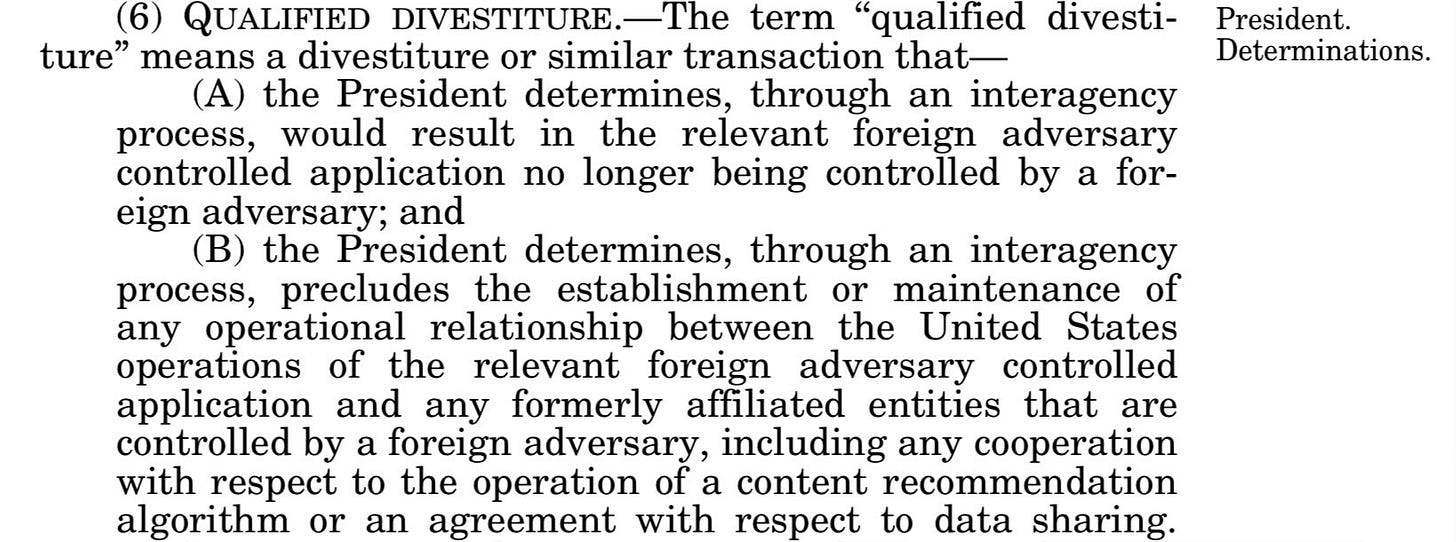US-China Madrid talks; TikTok "framework" deal; Nvidia and chips investigations; Wang Yi in Poland; Pre-made meals scandal
The US and China have reached some sort of a framework for a TikTok deal
The US and China have reached some sort of a framework for a TikTok deal, though there are no public details. According to a post from President Trump, he and Xi Jinping will speak Friday, so perhaps we will get more clarity after the Friday call between Xi and Trump.
According to a Xinhua report on the Madrid talks, the two sides “reached a basic framework consensus on appropriately resolving TikTok-related issues through cooperative means, reducing investment barriers, and promoting relevant economic and trade cooperation 就以合作方式妥善解决TikTok相关问题、减少投资障碍、促进有关经贸合作等达成了基本框架共识.” What investment barriers the PRC side believes the US agreed to reduce, and what relevant economic and trade cooperation the PRC side believes the US agreed to promote, are unclear.
That Xinhua report cited Vice Premier He Lifeng’s comments on TikTok:
He Lifeng stated that China’s determination to safeguard its own legitimate rights and interests is unwavering, and that it will resolutely protect national interests and the lawful rights and interests of Chinese-funded enterprises overseas. With regard to the TikTok issue, the Chinese side will carry out technology-export reviews in accordance with laws and regulations. At the same time, the Chinese government fully respects the wishes of our overseas enterprises and supports them in conducting equal commercial negotiations with partners on the basis of market principles.
何立峰表示,中方维护自身正当权益的决心坚定不移,将坚决维护国家利益和海外中资企业的合法权益。对于TikTok问题,中方将依法依规开展技术出口审批。同时,中国政府充分尊重我海外企业意愿,支持企业在符合市场原则基础上,与合作方开展平等商业谈判。
The report did not specify which “technology-export reviews” the PRC will carry out, but perhaps that means they will allow the export of the algorithm’s source code?
A Xinhua report on a press conference given by PRC negotiator Li Chenggang included this from Wang Jingtao, deputy director of the Cyberspace Administration of China:
both sides reached a basic consensus regarding the full respect for the will of the business as well as the law of the market on resolving the TikTok issue through such methods as the entrusted operation of TikTok's U.S. user data and content security business, and the license for use of the algorithm and other intellectual property rights.
The Chinese government will examine and approve relevant matters involving TikTok, such as the technology export and the license use of intellectual property, in accordance with relevant laws and regulations, Wang added...
It is interesting that Wang Jingtao 王京涛, a Deputy Director of the Office of the Central Cyberspace Affairs Commission and a Deputy Director of the Cyberspace Administration of China, attended the trade talks, but it makes sense given that TikTok was at the top of the agenda. Wang, in his recent article “Accelerating the Modernization of the National Cybersecurity System and Capabilities, Safeguarding High-Quality Development with a High Level of Security 加快推进国家网络安全体系和能力现代化 以高水平安全保障高质量发展”, which I have translated in full here, wrote:
Examining the security threats we face, the most immediate and frequently occurring do not come from the sea, land, air, or outer space, but from cyberspace—the so-called “fifth domain.” At present, the world is entering a period of turbulence and transformation; the international situation is marked by intertwined change and disorder; geopolitical conflicts are dragging on and escalating; “decoupling and breaking chains” is intensifying; and the countercurrents of unilateralism and protectionism are surging. Accelerating the modernization of the national cybersecurity system and capabilities is the due meaning of responding to external security threats in cyberspace and defending national cyberspace sovereignty. We must adhere to bottom-line thinking, strengthen our fighting spirit, focus on preventing and defusing major risks in cyberspace, and effectively safeguard national cyberspace sovereignty, security, and development interests.
The April 2024 Protecting Americans from Foreign Adversary Controlled Applications Act states that any “qualified divestiture” is only legal if it “precludes the establishment or maintenance of any operational relationship between the U.S. operations of the relevant application and any formerly affiliated entities that are controlled by a foreign adversary, including any cooperation with respect to the operation of a content recommendation algorithm or a data-sharing agreement”.
So would the new TikTok US entity get the algorithm source code and then have to figure out how to maintain and update it? That would not be easy. Or, as Fox Business’ Charles Gasparino tweeted, will they have to rewrite it from scratch?
SCOOP: US investors eyeing a deal to buy @tiktok_us say the guidance they are getting from the @WhiteHouse is that the Chinese will agree to allow the new owners to re-write the all important algorithm that the Chinese did not want to relinquish as part of any deal. This has to happen to avoid the penalty imposed by the US ban law. As I reported last night, Trump will “extend” again TikTok’s ability to remain active to allow the deal to be finalized and the 172 million accounts to be transferred. Xi gets to keep 20% of new TikTok US .
It would be even harder, take a long time and be very expensive if they have to create a new algorithm, if they can do it all. YouTube and Meta have spent a lot of money trying to develop algorithms like TikTok’s and they are not there. And it is really hard to recruit engineers who can build a good algorithm given the AI boom and the crazy money being thrown around by the AI labs. I wonder if the US government will try to push some sort of "transition period" to continue using the current ByteDance-controlled algorithm while trying to build a new one? That would be illegal, but that has not stopped things so far...For now, we are left to speculate, as we await details.
Summary of today’s Essential Eight:

